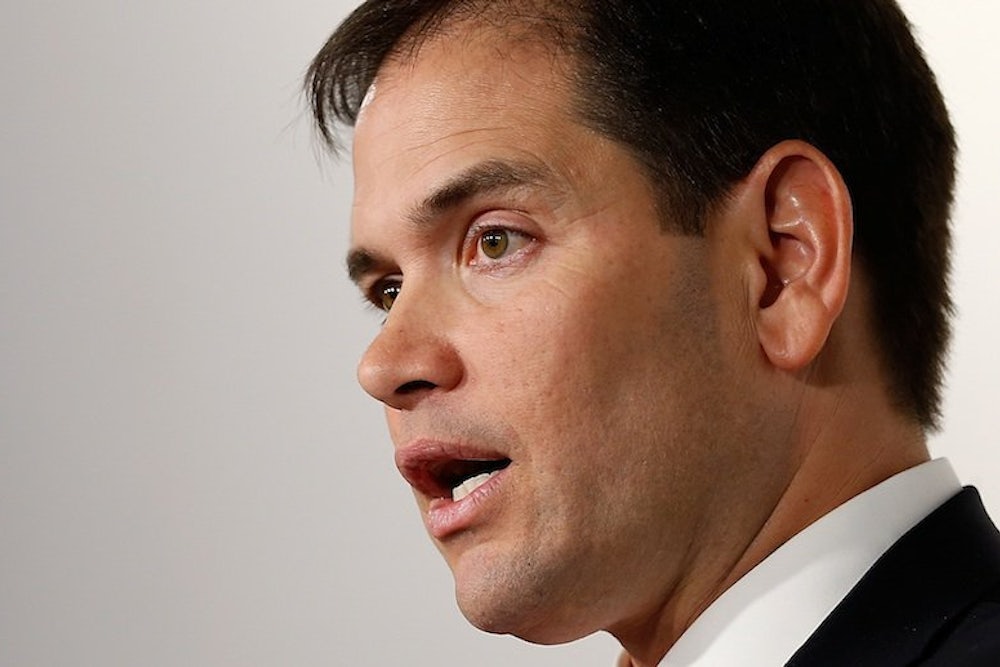Joshua Green's smart piece on Marco Rubio describes how the Senator from Florida has tried to reinvent himself as a policy wonk. The spark for this development is that Rubio, once the darling of the Republican Party, has seen his popularity and fortunes nosedive after he signed onto "comprehensive" immigration reform. Rubio reversed himself on immigration, and is now trying to focus on different issues: domestic energy sources, regulation of the internet, higher education, and other wonky favorites.
Behaving like a serious person interested in governing—especially after his politically motivated immigration flip-flops—might help Rubio regain a certain credibility with elite Republicans. But the political problem for Rubio remains two-fold: he is still getting tripped up by immigration reform, and he doesn't realize that his problem is more with the base of the G.O.P. than with its elites.
One of Rubio's big policy speeches took place at Google this week, where during the Q&A portion of the event he was asked whether amnesty would aid economic growth. Here was his answer:
“That’s just a fundamental decision the country will have to make. If the country decides they are prepared to incorporate 8 or 9 million people that violated our laws, the next question will be: ‘Are you prepared to have 8 or 9 million people living among you that can live here permanently for the rest of their lives but never become citizens?’
Actually, this was just part of his answer: The entire response went on for five minutes! He also added: “I don’t think it’s good for the country to have people that are forever permanently barred, who are legally here at this point but are permanently barred as citizens.”
What's hilarious about this answer is that he both makes his position somewhat clear—it feels a bit like a flip-flop on his previous flip-flop—but also tries to throw a bone to the right by talking about a violation "our laws." But the language undercuts the point he is attempting to make; in trying to woo the hardliners, he has instead reminded them why they feel the way they do. (Lawbreaking!) It's also not a good sign that after months and months of being asked the same thing, he hasn't come up with a pithier answer.
And what of Rubio's larger strategy? Green concludes his piece as follows: "[The Strategy is] a self-conscious nod to the old notion that ideas, expertise, and experience are prerequisites for the White House—and a bet that, despite today’s poll numbers and headlines, voters will eventually come to agree."
One can only speculate here, but Rubio's strategy seems to be suffering from the same flaw as his earlier immigration gambit. One of the fundamental shortcoming of that strategy was its focus on the elites of the Republican Party, rather than the activist base. The former may be responsible for a lot of the fundraising, and the eventual nominee is usually an establishment figure, but Rubio—especially after the collapse of Chris Christie—will get enough support from the more moderate wing of the Party anyway. As Ross Douthat noted in his New York Times column on Sunday, "As much as the party and the country have changed since the Bush era, the best way to unify the G.O.P. is still to build bridges between religious conservatives and moderate conservatives—in effect, to seem relatable to Santorum voters while reassuring Romney voters. And Rubio, in affect and background and positioning, may be the right politician for that task." Indeed. But right now his problem is more with base voters: The establishment may not have (m)any other places to turn.
It's possible the base of the party will view Rubio's newfound wonkiness in the positive way that Green alludes to. But it seems more likely that wonky forays into making government function better will not win over Tea Partiers already skeptical of Washington.
